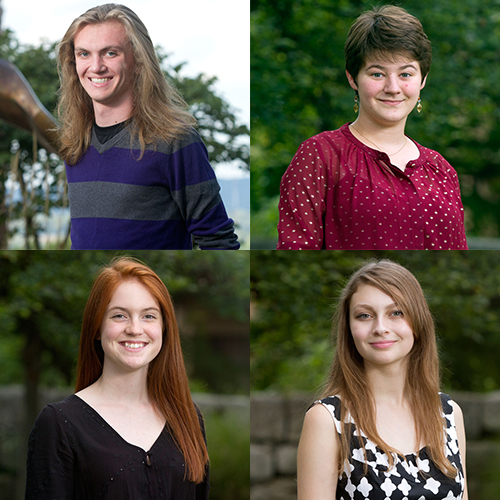WKU News
4 Gatton Academy Students Named Semifinalists in 2017 Siemens Competition
- Cheryl Kirby-Stokes
- Wednesday, October 25th, 2017

Caption: (Top Left) Camuel Hart ('18, Rowan County Senior HS), (Top Right) Wren Jenkins ('18, Paul G. Blazer HS), (Bottom Left) Keelee Pullum ('18 Warren Central HS), and Daniela Zieba ('18, Sayre School) were all named 2017 Siemens Semifinalist.
Four Gatton Academy of Mathematics and Science in Kentucky students have been recognized as national semifinalists in the 2017 Siemens Competition in Math, Science, and Technology.
The Siemens Competition is the nation’s premier science research competition for high school students. The Siemens Competition received over 1,860 student submissions this year. The Gatton Academy is Kentucky’s only school to have students recognized in 2017.
Camuel Hart, a second-year student from Morehead (Rowan County Senior High School), Wren Jenkins, a second-year student from Ashland (Paul G. Blazer High School), Keelee Pullum, a second-year student from Bowling Green (Warren Central High School), and Daniela Zieba, a second-year student from Lexington (Sayre School) were honored by the competition.
“I am proud of the initiative, persistence, and perseverance demonstrated by Keelee, Wren, Daniela, and Cam,” said Dr. Lynette Breedlove, Director of The Gatton Academy. “These students pursued their interests and sought out opportunities well beyond the classroom, while successfully tackling a full college course load. I am also thankful for the support of their faculty mentors who shared their time, expertise, and laboratories with the students. This honor demonstrates what talented students can do when given the opportunity and resources to soar.”
Hart, son of Rebecca and Bradley Hart, began his research with Dr. Claus Ernst in the WKU Mathematics Department in September of 2016. Hart and Ernst worked together to identify an algorithm applicable to knot theory.
Dr. Ernst explained, “Cam was working on research in knot theory – a subfield of a mathematical branch called topology. Topology is a field of mathematics that includes all sorts of geometric objects. In our case these objects are knots. A knot can be thought of as a piece of rope that has been tangled up and fused at the ends so it cannot be untangled. Cam was working on a computer program using Mathematica that can manipulate diagrams of knots by a deformation of a knot called a flype.”
Jenkins, daughter of Kim and Scott Jenkins, and Zieba, daughter of Sonya and Piotr Zieba, were mentored by Dr. Jeffrey Galloway in the WKU Department of Computer Science. Dr. Jean-Luc Houle of the WKU Department of Folk Studies & Anthropology also provided mentorship and expertise to the application of the project. The computer science project created optimal digital note-taking software for anthropology fieldwork.
Dr. Galloway said that Zieba has been active with WKU’s Cloud Engineering Lab since fall 2016. Then, collaborative work between Zieba and Jenkins began. Their first project together was development of a middleware for cloud computing architectures.
Dr. Houle stated, “Daniela met with me after learning of my archaeological research in Mongolia. She was hoping to combine her skills in computer science with her newfound interest in archaeology. I suggested to her that an archaeological field research recording and management system might be the way to go. Daniela and her collaborator, Wren Jenkins, did not disappoint! This is the type of interdisciplinary applied project that gets me really excited because it creates connections between traditionally discrete disciplines such as mathematics, the sciences, and social studies. I’m very proud of them being semi-finalists of the Siemens competition.”
Pullum, daughter of Gina Neal and Charles Pullum, began her research with Dr. Noah Ashley in the WKU Biology Department in February of 2017. Pullum and Ashley looked at a wide variety of issues pertaining to both chronic and acute sleep disruption, sleep deprivation, short sleep, and sleep fragmentation. In addition to certain lifestyle issues, sleep disturbance can also be the result of disorders such as sleep apnea, Alzheimer’s disease, and Parkinson’s disease.
Dr. Ashley stated, “Keelee’s research on the effect of sleep fragmentation upon changes in astroglial morphology and activation in the rodent brain has produced some remarkable results; she found that just 24 hours of sleep loss leads to astrogliosis, a cellular change linked to chronic, debilitating diseases, like Alzheimer’s disease. It is no surprise to me that Keelee has been selected as a semi-finalist for the Siemens competition. She is naturally curious, a talented writer, and an exceptionally focused and driven researcher. She has also demonstrated mastery of highly advanced and technical neurobiological techniques, like immunocytochemistry and quantitative brain stereology. I am incredibly fortunate to have such an exceptional student working in my lab with such great potential and maturity.”
About the Siemens Competition: The Siemens Foundation established the Siemens Competition in Math, Science & Technology in 1999. The Competition is the nation’s premier science research competition for high school students and seeks to promote excellence by encouraging students to undertake individual or team research projects. It fosters intensive research that improves students’ understanding of the value of scientific study and informs their consideration of future careers in these disciplines.
About The Gatton Academy: Established in 2007, The Gatton Academy is Kentucky’s first residential high school for gifted and talented junior and seniors. The Gatton Academy’s students enroll as juniors and are full-time WKU students pursuing their interests in advanced science, technology, engineering and mathematical careers. The Gatton Academy has been named to the Washington Post’s list of top-performing schools with elite students for nine consecutive years.
Contact: Zack Ryle, (270) 745-2971
Some of the links on this page may require additional software to view.

